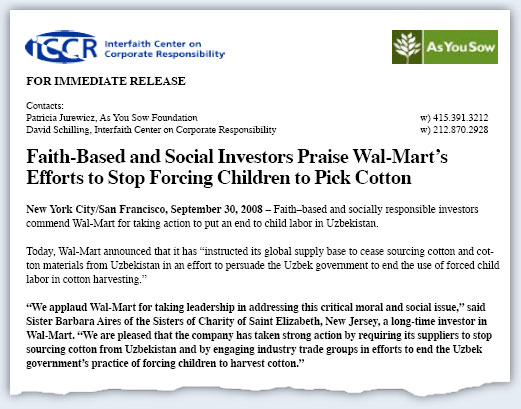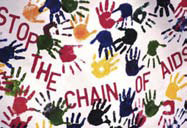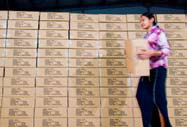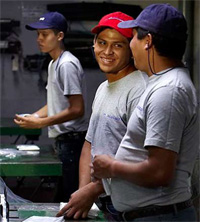Programs and Initiatives
In addition to working directly with our suppliers, we participate in a number of working groups such as the GSCP and MFA Forum, that serve as vehicles to share our experiences and gain new information that can help us continue to improve our operations and supply chain.
We also participate in industry working groups managed by the Business for Social Responsibility. Their Apparel, Mills and Sundries Working Group, for instance, brings together apparel companies, suppliers and retailers to strengthen the implementation of positive labor and environmental practices in the apparel supply chain. We also participated in the Beyond Monitoring working group, which included the "Go to Market" initiative, providing insight into methods of aligning social and commercial objectives.
Improving Lives Where Wal-Mart Merchandise Is Produced
In 2005, we launched the International Development Program in partnership with the Wal-Mart Foundation, which funds local non-governmental organizations (NGOs) and helps them operate schools, health clinics and training centers in communities. This program was developed and is maintained to address the specific needs of factory workers and their families.
The program now supports six projects with operations in 14 countries — Chile, China, Costa Rica, the Dominican Republic, Ecuador, El Salvador, Guatemala, Honduras, India, Kenya, Lesotho, Mexico, Nicaragua and Peru. Our projects are guided by the United Nations Millennium Development Goals focusing specifically on empowerment of women, education and HIV/ AIDS education. Since its inception, the International Development Program has donated more than $5 million USD to the launch and continued operation of these programs. Click here to view a video about our support for the U.N. Millennium Development Goals.
Responsible Sourcing in Action

In 2007, we became aware of allegations that children were being forced to work in the cotton fields of Uzbekistan. Wal-Mart immediately began researching the allegations, commissioned a third-party study of the Uzbek cotton industry, and assembled a coalition of brands, retailers and trade associations to address the issue. As we learned more, the coalition was broadened to include non-governmental organizations (NGOs), socially-responsible investment groups, international aid organizations and various U.S. government agencies. With our partners, we spearheaded a letter campaign on behalf of the industry to the President of Uzbekistan, the U.S. Secretary of State, the Secretary-General of the International Labour Organization and other foreign trade associations to condemn the use of forced child labor in Uzbekistan. After an attempt to meet with the Uzbek government was cancelled, we instructed our global supply base on September 30, 2008, to discontinue sourcing cotton and cotton-based materials from Uzbekistan.
As a result of this action, we are working with NGOs and industry trade associations on developing the capability to trace cotton used in merchandise back to its origin.
Projects of the International Development Program
Hope Worldwide
Founded in 1991, HOPe Worldwide seeks to deliver sustainable, high-impact, community-based services to the poor and needy.
Kenya

In Kenya, Hope Worldwide has established an impressive set of support programs, such as Kids Clubs for the children of factory workers, HIV/AIDS seminars in factories and entrepreneurial training for workers. To date, more than 2,900 children have participated in programs that provide computer literacy and basic education. Additionally, more than 1,300 individuals have received vocational and language training.
India

Hope Worldwide in India focuses on education and training for both children and young adults. Five centers have been established in communities with factories. To date, more than 2,900 children have participated in programs teaching computer literacy and basic education, and more than 1,300 people have received vocational and language training.
Central American Workplace Project

The Continuous Improvement in the Central American Workplace (CIMCAW) project brings together a diverse group of stakeholders to form a multisector alliance working to improve standards compliance in the textile and garment sector in the Dominican Republic, El Salvador, Guatemala, Honduras and Nicaragua. CIMCAW aims to help the sector respond to increasing market demand for products made under ethical conditions; confront the challenges that have emerged after the end of the Multi-Fiber Arrangement; and take advantage of opportunities created by new trade agreements, such as the Dominican Republic — Central American Free Trade Agreement (DR-CAFTA). To date, the project has helped nearly 24,000 workers receive education on national labor standards, labor legislation, gender issues and dispute resolution. Additionally, CIMCAW has increased communication effectiveness between management and workers, as well as the establishment of incentive programs.
Apparel Lesotho Alliance to Fight AIDS

Lesotho's textile and apparel industry is supported by approximately 46,000 workers — most of whom are women, and nearly one-third of whom are HIV-positive. In 2007, the Apparel Lesotho Alliance to Fight AIDS (ALAFA) approached Wal-Mart about helping the organization strengthen and continue its mission of providing HIV and AIDS prevention and treatment for workers in the textile and apparel industries — an especially important charge in a country where roughly 40 percent of citizens are HIV positive.
Our commitment to factory workers compelled us to get involved. We made a three-year grant to support ALAFA, which funds an HIV/AIDS workplace program, education and prevention, voluntary testing and counseling and disease management services in factories. We are proud to partner with ALAFA because, as an organization, it is somewhat unique in its intense focus on factory workers and on women, who are often at greater risk of contracting the HIV virus. Also, the HIV/AIDS workplace program's reach across the retail and apparel industries, encompassing a number of global brands, allows the program to make a profound and meaningful difference in the lives of these workers. Today, more than 38,000 textile industry employees (66 percent of the total textile workforce in Lesotho) have access to ALAFA's prevention services, and more than 27,000 workers have taken advantage of the care and treatment component of the program.
The Asia Foundation

The International Development Program supports The Asia Foundation in its efforts to improve the lives of migrant workers in China. Through this work, 70 women in the coming years will receive scholarships for education and training in fields such as logistics, accounting, office management and English as a Second Language.
Mobility International USA
Mobility International USA (MIUSA) operates programs called I-Lead (International Leadership, Employment and Disability) that aim to increase employment opportunities for people with disabilities. Through these programs, participants are immersed in the training series called "Employment Strategies: Building Disability Leadership Skills," and are provided an opportunity to learn about legal rights, workplace advancement and social networking.
Other Community-Based Programs
We also invest in communities where we operate through other programs that are supported by our stores and country-based foundations. We have featured several of these efforts in the "Giving" section of our Corporate Sustainability Report. Click here to view these stories.
Factory Workers' Voices

Wal-Mart values the opportunity to interact with workers during our visits to factories. In doing so, we gain the worker's perspective on the factory, including what can be, and has been, improved. This dialogue is vital to factory improvement, and the insight provided enables our team to focus efforts on areas that can tangibly enhance the lives of workers and result in factory improvements. These workers from Southeast Asia provided us with some key insight on their opinions of the factories:
- Sompetch Chaimongkol, who works at O&I Industrial Co., Ltd., told us that before Wal-Mart conducted its audit, the factory was dirty and didn't have very good rules and regulations. Once the audit was completed, changes were made to the factory, including increased workplace safety, improved cleanliness and better benefits for workers.
- Rohma, who works at PT Cresyn, appreciates that her salary is paid on time and that the management responds quickly to problems that arise in the factory. After Wal-Mart conducted its audit of the factory, additional facilities and practices were put in place that benefitted the workers.
- Piyawadee Lekseng, at O&I Industrial Co., Ltd., noted that after Wal-Mart conducted its audit of the factory, the factory reduced its dust and pollution, provided labeled waste containers to keep the workplace cleaner, and improved safety, health and hygiene standards. The improvements have raised morale among workers and improved their working conditions.




